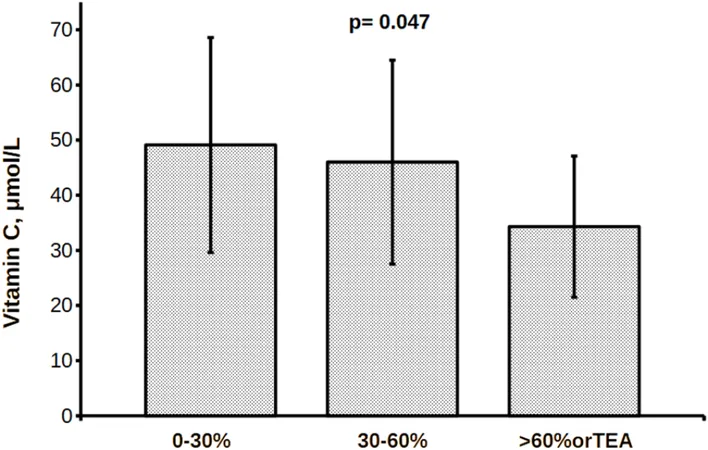
Shocking Revelation: Low Vitamin C and Fruits and Veggies Consumption May Elevate Heart Disease Risks in Type 2 Diabetics!
2025-04-05
Author: Wei
Introduction
New research has unveiled alarming insights into the potential risks faced by patients with Type 2 Diabetes (T2D) regarding cardiovascular diseases and vitamin C levels. The study emphasizes the crucial role vitamin C plays as a powerful antioxidant and highlights the worrying prevalence of vitamin C deficiency among T2D patients.
Study Aims and Methods
This groundbreaking research aimed to ascertain the prevalence of vitamin C deficiency in T2D outpatients, probe the connection between vitamin C levels and cardiovascular diseases, and evaluate the role of fresh fruit and vegetable consumption on vitamin C levels and cardiovascular health.
Conducted with 200 ambulatory T2D patients, the research meticulously measured vitamin C levels using sophisticated high-performance liquid chromatography (HPLC) and assessed nutritional intake through a food frequency questionnaire. To strengthen the results, exclusions were implemented for patients taking vitamin supplements within the last six months, focusing solely on dietary vitamin intake.
Key Findings
A staggering 12.2% of participants were found to have vitamin C deficiency. Those affected showed significantly reduced levels of vitamin C alongside a higher prevalence of cardiovascular diseases. Notably, patients who consumed more fresh fruits and vegetables exhibited elevated vitamin C levels, underscoring the undeniable link between diet and heart health.
The study utilized multiple logistic regression analysis, revealing that vitamin C levels were independently associated with cardiovascular diseases. Specifically, the research illustrated how lower serum vitamin C concentrations correlated with severe cardiovascular complications, like ischemic heart disease and increased carotid artery stenosis.
The Double-Edged Sword of Vitamin C
Interestingly, the relationship between vitamin C supplementation and cardiovascular risk remains complex, with some studies suggesting potential adverse outcomes with high-dose supplements. Natural sources of vitamin C, mainly from fruits and vegetables, provided a protective advantage that supplements did not replicate.
It's crucial to consider that while vitamin C is vital, indiscriminate supplementation without dietary improvements could exacerbate health troubles for diabetics. Thus, the recommendation emphasizes harnessing the benefits of whole foods over pill forms.
Dietary Implications
Regular consumption of fresh fruits and vegetables emerged as a significant factor in maintaining healthy vitamin C levels and could play an essential role in mitigating cardiovascular risk among T2D patients. A diet rich in these foods is associated with improved heart health, enhanced cholesterol levels, and lower triglycerides, making dietary advice imperative for those managing diabetes.
The study encourages proactive dietary changes, noting the alarming statistics that link low fruit and vegetable intake to millions of premature deaths. It advocates for at least 500 to 800 grams of these food groups daily, proposing that health interventions must prioritize fresh produce access and education in managing diabetes and cardiovascular health.
Conclusion
This study showcases a troubling association between vitamin C deficiency and heightened cardiovascular disease risk among Type 2 diabetics. It underlines the need to prioritize fresh fruit and vegetable consumption as a means to bolster heart health while spotlighting the complexities surrounding vitamin C supplementation. As the push for healthier dietary habits gains momentum, this research serves as a clarion call for patients and healthcare professionals to advocate and implement nutritional strategies vital for optimal health.
Important Note: While the discoveries emphasize the significance of natural food sources for vitamin C intake, further exploration and longitudinal studies are essential to disentangle the intricate relationships between supplementation, diet, and health outcomes.



 Brasil (PT)
Brasil (PT)
 Canada (EN)
Canada (EN)
 Chile (ES)
Chile (ES)
 Česko (CS)
Česko (CS)
 대한민국 (KO)
대한민국 (KO)
 España (ES)
España (ES)
 France (FR)
France (FR)
 Hong Kong (EN)
Hong Kong (EN)
 Italia (IT)
Italia (IT)
 日本 (JA)
日本 (JA)
 Magyarország (HU)
Magyarország (HU)
 Norge (NO)
Norge (NO)
 Polska (PL)
Polska (PL)
 Schweiz (DE)
Schweiz (DE)
 Singapore (EN)
Singapore (EN)
 Sverige (SV)
Sverige (SV)
 Suomi (FI)
Suomi (FI)
 Türkiye (TR)
Türkiye (TR)
 الإمارات العربية المتحدة (AR)
الإمارات العربية المتحدة (AR)